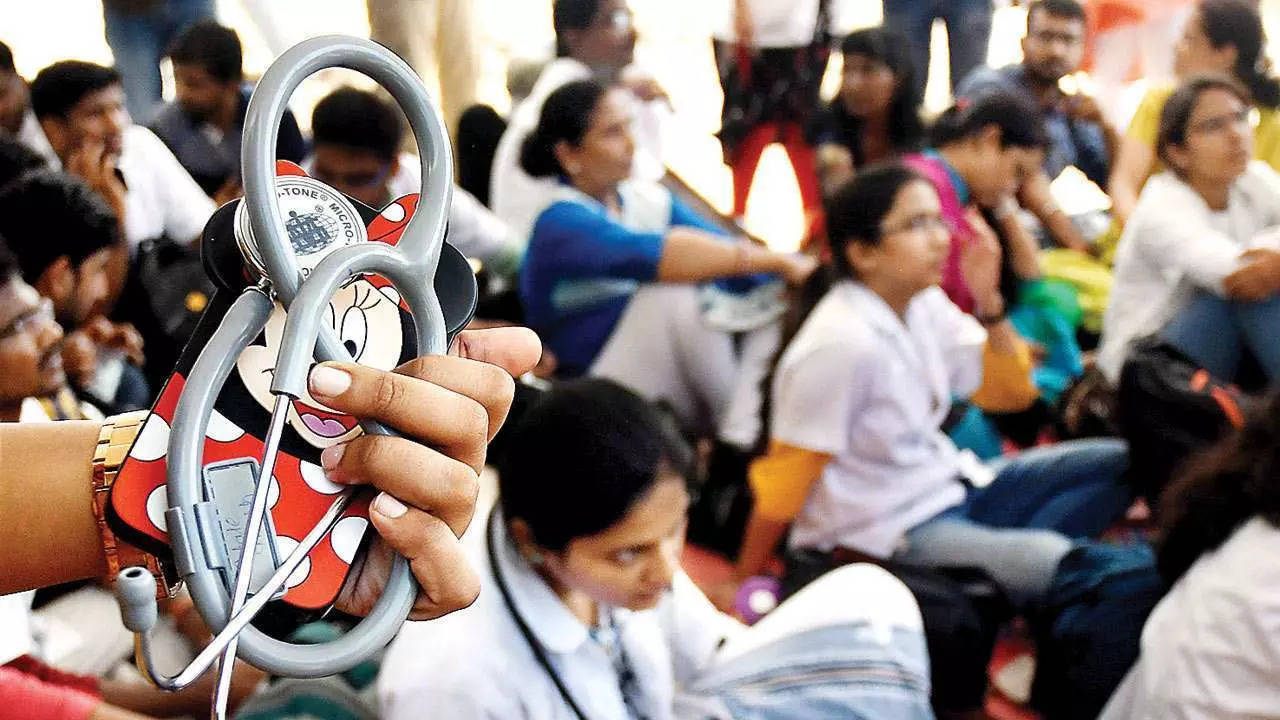Health Minister Refutes Allegations of NEET PG Cut-off Reduction Amidst Controversy

Health Minister Refutes Allegations of NEET PG Cut-off Reduction Amidst Controversy
In a recent turn of events, Health Minister Mansukh Mandaviya has come forward to vehemently deny accusations that he manipulated the qualifying percentile for the NEET PG 2023 examination in favor of his daughter. This development follows a wave of public outcry and speculations regarding the alleged reduction of the NEET PG cut-off to zero, purportedly to benefit his offspring.
Mandaviya, who has been at the forefront of India’s healthcare initiatives, responded to the allegations with a stern rebuttal. He firmly asserted that his daughter had not even registered for the NEET PG exam, rendering any claims of favoritism baseless and unfounded. The Minister emphasized the importance of maintaining the integrity of the examination process and the need to ensure equal opportunities for all aspiring medical professionals.
This controversy emerged as a shock to many, as Disha Mandaviya, the daughter of the Health Minister, had previously been recognized for her dedication to the healthcare sector. In 2021, during the height of the COVID-19 pandemic, she served as an intern doctor at a COVID-19 hospital, displaying unwavering commitment to the welfare of patients and the medical field as a whole.
The NEET PG (National Eligibility cum Entrance Test for Postgraduate Medical Courses) is a highly competitive examination that serves as a gateway for medical graduates to pursue further studies and specialization in various fields of medicine. The eligibility criteria and qualifying percentiles for this examination are crucial, as they determine the selection of candidates who can continue their medical education at the postgraduate level.

The controversy began when reports started circulating, suggesting that the qualifying percentile for NEET PG 2023 had been drastically reduced, ultimately allowing more candidates to secure seats in postgraduate medical courses. Critics argued that such a reduction could potentially dilute the quality of medical education in the country and compromise patient care in the long run.
In the midst of these allegations, the Health Minister found himself at the center of the storm. Accusations of nepotism and misuse of power began to surface, with some alleging that the cut-off reduction was a thinly veiled attempt to benefit his daughter, Disha, who is reportedly considering pursuing a career in medicine.
However, Mansukh Mandaviya, a prominent figure in Indian politics and healthcare administration, swiftly addressed these accusations. He clarified that the decision to set the qualifying percentile for NEET PG 2023 was made by a panel of experts and was in no way influenced by personal considerations. The Health Minister emphasized that he remained committed to upholding the standards of medical education in the country and ensuring transparency in the examination process.
The controversy surrounding Disha Mandaviya’s internship in a COVID-19 hospital in 2021 further fueled speculations. Some individuals speculated that her previous involvement in healthcare might have swayed the decision-making process. However, the Health Minister underscored that his daughter’s past contributions to the healthcare sector were unrelated to the NEET PG examination, as she had not expressed any intent to pursue postgraduate medical studies.

As this controversy unfolds, it highlights the importance of maintaining the objectivity and impartiality of critical examinations like NEET PG. The examination serves as a gateway for thousands of aspiring doctors who seek to advance their careers and contribute to the healthcare system. Any perception of favoritism or manipulation in the evaluation process can undermine the credibility of the entire system and erode trust in the healthcare infrastructure.
The Health Minister’s denial of any involvement in altering the NEET PG cut-off is a significant statement of commitment to fair and transparent evaluation procedures. It serves to reassure the medical community and the public that the government remains steadfast in its dedication to upholding the highest standards in medical education.
While this controversy may raise questions about the transparency of decision-making in India’s medical education system, it also serves as a reminder of the importance of maintaining the integrity of such examinations. The NEET PG cut-off percentile is not a matter to be taken lightly, as it directly impacts the future of aspiring doctors and the quality of healthcare services in the nation.
The controversy surrounding the NEET PG cut-off reduction also highlights the broader issue of accountability and transparency in India’s education and healthcare sectors. Many citizens and stakeholders are calling for a thorough and impartial investigation into the decision-making process that led to the alleged cut-off adjustment. Such an investigation could help dispel doubts and restore trust in the system.
Moreover, this incident underscores the importance of separating personal and professional matters, particularly in high-profile government positions. Public officials, including the Health Minister, must be cautious about any perceived conflicts of interest to maintain the public’s trust in their actions and decisions. In this case, the Minister’s swift denial and clarification have helped address concerns, but it also serves as a reminder of the need for utmost transparency and ethical conduct in public service.
As the controversy unfolds, it’s essential for both the government and the medical community to engage in open dialogue and ensure that any potential flaws in the NEET PG examination system are identified and rectified promptly. The integrity of medical education in India relies on a fair and unbiased admission process, free from any undue influence or favoritism.

In the coming weeks, the focus will likely shift to the investigative processes and the steps taken to prevent such controversies in the future. Ultimately, the goal is to preserve the credibility of India’s medical education system and ensure that aspiring doctors receive the best possible education, free from any doubts about the fairness of the selection process.
In conclusion, the Health Minister’s denial of allegations related to the reduction of the NEET PG cut-off percentile underscores the need for vigilance and transparency in the medical education system. As the controversy continues to unfold, it is imperative that all stakeholders prioritize the fairness and objectivity of examinations that shape the future of healthcare in India. The nation’s commitment to providing the best medical education and healthcare services depends on it.



